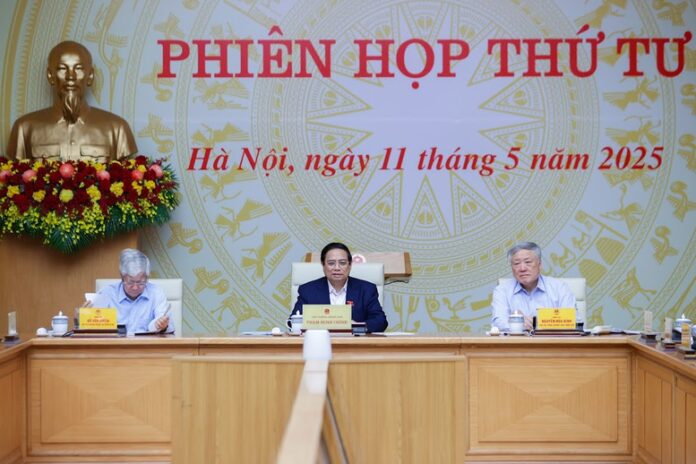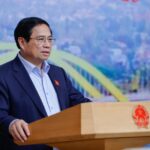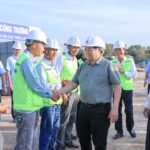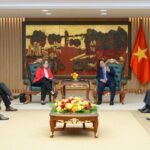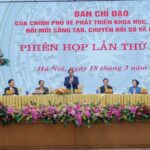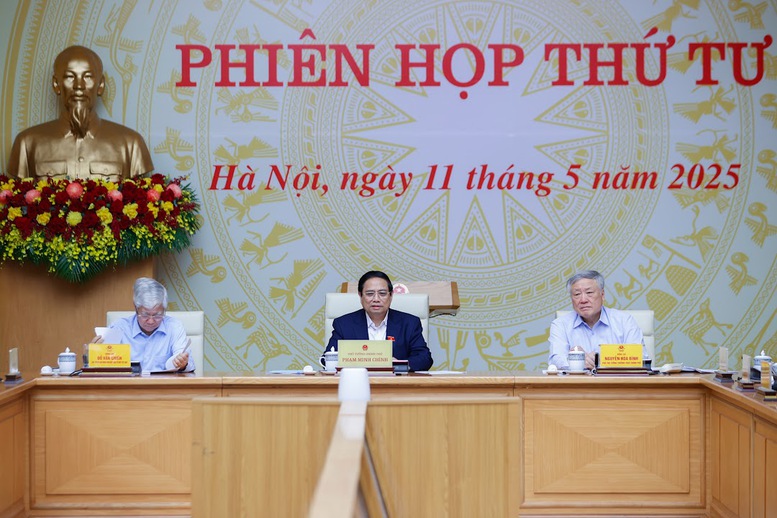
The fourth meeting of the Central Steering Committee for the Deployment of the Elimination of Temporary and Dilapidated Houses Nationwide took place on the morning of May 11 – Photo: VGP/Nhat Bac
Attending the meeting were Permanent Deputy Prime Minister Nguyen Hoa Binh, Deputy Head of the Steering Committee; Chairman of the Central Committee of the Vietnam Fatherland Front Do Van Chien, Deputy Head of the Steering Committee; and representatives of leaders of ministries and sectors.
The meeting was connected online to the headquarters of the People’s Committees of provinces and centrally-run cities.
Nearly 209,000 temporary and dilapidated houses have been eliminated nationwide
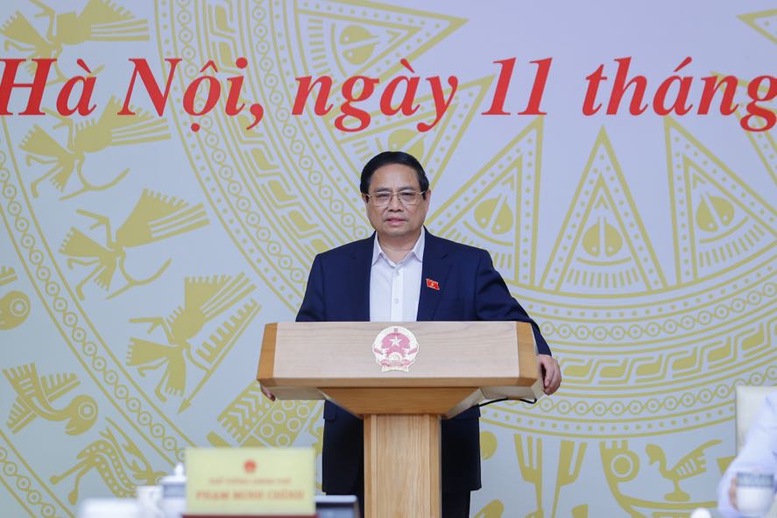
Prime Minister Pham Minh Chinh delivers the opening speech at the fourth meeting of the Central Steering Committee for the Deployment of the Elimination of Temporary and Dilapidated Houses Nationwide – Photo: VGP/Nhat Bac
In his opening speech, Prime Minister Pham Minh Chinh stated that eliminating temporary and dilapidated houses nationwide for the people is a very humane and meaningful task, which has been carried out very actively with the spirit and motto of “whoever has anything helps with that, whoever has labor helps with labor, whoever has money helps with money, whoever has a lot helps a lot, and whoever has a little helps a little.”
At the third meeting (on March 10, 2025), the Steering Committee continued to unify the direction, method of implementation, and assign specific tasks to members, ministries, agencies, and localities with the spirit of “only discussing how to do it, not discussing how to retreat; determined to complete the goal of basically eliminating temporary and dilapidated houses nationwide by October 31, 2025.”
After the third meeting, we continued to implement many tasks. Basically, a full system of documents has been issued according to the authority to promote the deployment of the program of eliminating temporary and dilapidated houses nationwide; especially the documents guiding, solving difficulties and problems, and answering the proposals of the localities.
Based on the direction of the Prime Minister, Head of the Central Steering Committee in Announcement No. 158/TB-VPCP, up to now, the central agencies and localities have completed 18/27 tasks and are implementing 09/27 tasks.
From the launch so far, nearly 209,000 houses have been eliminated nationwide (including: inaugurating and handing over 111,000 houses; starting construction of 98,000 houses), accounting for about 77% of the total demand. From the third meeting until now, there has been an increase of nearly 87,000 houses being started and inaugurated, averaging 26 houses/locality/day.
Along with the efforts of the supported people; the voluntary and selfless help of the community, neighbors, relatives, clans, and mass organizations; the leaders of localities and sectors have been very active and enthusiastic; many houses have been built with a value much higher than the state-supported capital.
This is a very encouraging result in the context that the levels, branches, and localities are simultaneously performing many tasks, especially arranging the organizational apparatus, building local government at 2 levels; promoting economic growth to reach 8% or more in difficult conditions.
However, the task from now until October 31, 2025 is still very heavy (there are still about 61,800 temporary and dilapidated houses) because it involves many ministries, agencies, and localities, the scope of implementation is wide, while the remaining time is not much (about 170 days). On average, about 364 houses must be completed per day nationwide; on average, each locality must complete 08 houses/day.
Therefore, it is necessary to promote the efforts of the levels, branches, and localities, with higher determination, greater determination, more drastic and effective actions, and more focus on the key points to successfully achieve the goal of the Program.
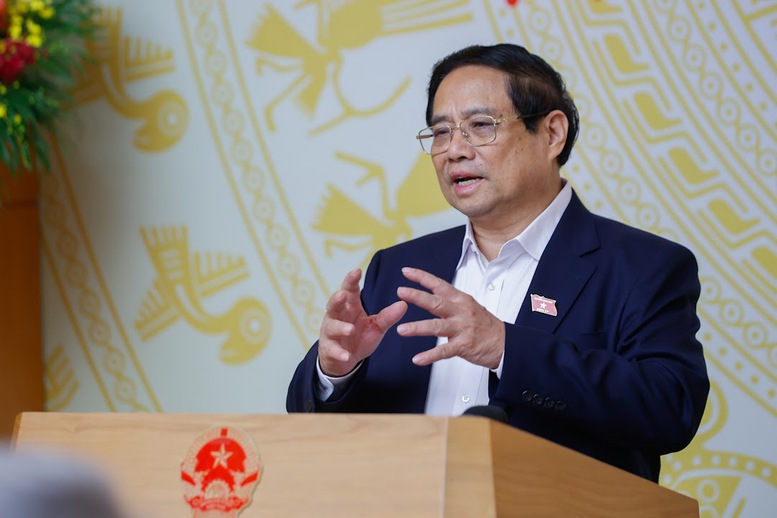
The Prime Minister suggested that the delegates focus on evaluating the actual situation and results of the implementation of the Program; continue to clarify the difficulties, obstacles, and challenges in the implementation of the Program; answer proposals and recommendations to remove difficulties related to the Program – Photo: VGP/Nhat Bac
At the meeting, the Prime Minister suggested that the delegates exchange and discuss frankly and responsibly, focusing on evaluating the actual situation and results of the implementation of the Program in the ministries, agencies, and localities; continue to clarify the difficulties, obstacles, and challenges in the implementation of the Program (on procedures and processes of implementation; methods of allocating support capital; arrangement of land; issues of human resources, transportation of materials; use of 5% savings of regular state budget expenditures in 2024, etc.).
Along with that, answer the proposals and recommendations of the localities, remove difficulties related to support capital for housing for people with meritorious services and families of martyrs and the two national target programs; lessons learned in directing, administering, allocating, and mobilizing resources in the spirit of “6 clear: clear people, clear jobs, clear results, clear progress, clear responsibilities”; key tasks and breakthrough solutions to maintain the momentum, maintain the pace, maintain the spirit, and maintain the progress of the movement; what is good should be promoted and replicated, what is not good should be drawn experience and adjusted.
Many good experiences and effective ways of doing things at the locality
At the meeting, representatives of some localities that have completed the elimination of temporary and dilapidated houses shared their experiences and ways of doing things in implementing the assigned tasks and plans.
Mr. Trinh Viet Hung, Secretary of the Provincial Party Committee of Thai Nguyen: Up to now, Thai Nguyen province has inspected and supported the elimination of temporary and dilapidated houses, reaching 100% compared to the plan. Some households have mobilized support from the province, social organizations, families, clans…; some houses have been built with a large amount of capital.
In the period of 2021-2025, Thai Nguyen province has supported the elimination of temporary and dilapidated houses, reaching 100%. The province also has initiatives in the implementation process. First is to assign provincial executive committee members to inspect, inspect, and record all cases before supporting, determining the time and progress, and regularly updating the progress, when completed, a handover acceptance must be made.
In the implementation process, poor and near-poor households due to awareness do not apply for land use right certificates, after inspection, we have granted land use right certificates to them.
However, there is a situation where poor and near-poor households, mainly ethnic minorities, when they have a new house with value and a certificate, intend to, and some households have, transfer the land use right, sell the house to others. This easily leads to a situation of re-impoverishment. The province has foreseen and directed the inspection, grasped the situation, encouraged, propagated, and educated poor and near-poor households about the Party and State’s policies on poverty reduction.
Another thing is that many ethnic minority households have many children, so it is very easy to fall back into poverty. The province is inspecting and requesting political and social organizations to join hands to mobilize, propagate, and help these households not to fall back into poverty due to having many children.
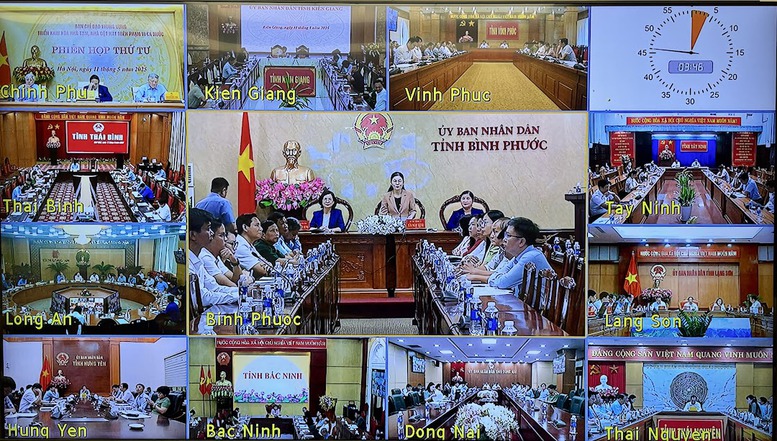
Ms. Ton Ngoc Hanh, Secretary of Binh Phuoc Provincial Party Committee, shared creative ways to implement the construction of prefabricated houses on land with problems so that poor and difficult households have houses – Photo: Screenshot: VGP
Ms. Ton Ngoc Hanh, Secretary of Binh Phuoc Provincial Party Committee: Binh Phuoc has completed the program of eliminating temporary and dilapidated houses. After the Prime Minister launched this program, Binh Phuoc launched a 200-day and night emulation movement to eliminate temporary and dilapidated houses in the province. This program has been implemented by Binh Phuoc province since 2018. The number of houses left to be built was about 800, and the province completed it in the recent April 30th period. The number of houses left is not much, but the related problems are very complicated, mainly related to land issues. Like other localities, the people living in these houses do not have land use certificates, the origin of the land is borrowed land, forest land, and land overlapping with bauxite mining planning. Therefore, it was impossible to build before. This time we had to try harder and implement synchronous solutions to solve the problem. In the face of these difficulties and problems, Binh Phuoc province has proposed the following solutions:
First, mobilize relatives to donate land, make papers, and make land use certificates for the poor and near-poor households of Binh Phuoc province (there are about 40 houses donated by enterprises, accounting for about 5%. Then make land use certificates for people to build houses, each land use certificate is about 200m2, separate land use certificates for each household). This is also the point that helped Binh Phuoc complete the plan. The rest of the houses are for people living on forest land and living in the area of land overlapping with bauxite mining planning. Binh Phuoc asked for the direction of the Steering Committee and the Provincial Party Committee Standing Committee to build prefabricated houses for people to live on this land area and at the same time carry out the next procedures according to the common policy of the Government. If the land use certificate cannot be granted immediately, the province will build prefabricated houses and require the households to sign a commitment not to sue later and to dismantle when moving, and all members must move. The members all agreed and supported having a new house to live in. Then, the local authorities continue to carry out the next procedures in a regular and official manner for the households. If it is not implemented by building prefabricated houses for the households to live in the bauxite planning area, it will be impossible to complete the remaining number of houses with more than 90 houses in the bauxite planning area.
Binh Phuoc has 4 lessons learned from the implementation of this program as follows:
First is high political determination associated with the responsibility of the leaders. Binh Phuoc attaches the responsibility for implementing this task to the secretaries and chairmen of the district-level Party Committees and People’s Committees to be responsible to the Provincial Party Committee and the Central for all inspection, construction, and housing support work on the local premises. Even if the inspection is wrong, the object is not guaranteed, and the inspection is not careful, the secretaries and chairmen must take responsibility. If the proposal is lacking, it is necessary to mobilize and socialize by itself.
Second is the drastic direction, close follow-up of the work, the establishment of working groups, clear division of tasks, close coordination between the members of the Steering Committee. Comply with the weekly reporting regime, especially the role of the Fatherland Front at the grassroots level in inspecting, supervising, and closely and continuously monitoring each household and each house at the grassroots level. Therefore, the work has been deployed to ensure progress. Along with that is the wholeheartedness, dedication, closeness to the people, understanding of the people, and direct responsibility for each specific job, avoiding complaints and denunciations.
Third is the creativity and flexibility in the way of doing things, based on the direction of the Central to continue to remove difficulties and obstacles for the people, especially in the implementation of building prefabricated houses on bauxite planning land and then solving the next procedures in parallel.
Fourth is the socialization, mobilizing enterprises to support land funds as well as sponsors for land and money to build houses. The level of support of Binh Phuoc for people with meritorious services is about VND 100 million/house; normally the other houses are VND 80 million/house; the repaired house is VND 40 million/house. In addition, mobilize the branches, unions, and mass organizations to contribute labor to have more solid and beautiful houses.
Binh Phuoc will summarize this program on May 16; continue to carry out the next procedures; inspect families with meritorious services from now until the end of the year and in the coming years to make their lives better.
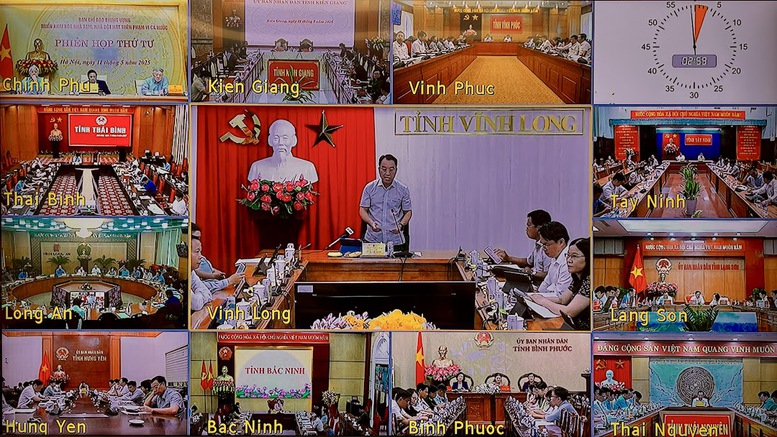
Mr. Lu Quang Ngoi, Chairman of the People’s Committee of Vinh Long province, shared his experience in eliminating temporary and dilapidated houses in the locality – Photo: Screenshot: VGP
Mr. Lu Quang Ngoi, Chairman of the People’s Committee of Vinh Long province: Following the direction of the Government, the Prime Minister, and the Head of the Central Steering Committee, the province has focused on implementing with the determination to strive to complete the plan by April 30. To implement this plan, the province of Vinh Long organized a summary on April 30, on the occasion of the 50th anniversary of the Liberation of the South and National Reunification. Specifically, the province has built 1,328 houses, including 492 newly built houses, and the rest are repaired houses. Houses for people with meritorious services and families of martyrs are 497 houses, houses for poor and near-poor households are 790 houses, and houses for ethnic minority households are 41 houses, with a value of VND 86 billion.
The province has proactively arranged this amount of money, in which for families with meritorious services and families of martyrs, the province proactively advanced VND 22 billion from the Gratitude Fund. For poor and near-poor households, the province also proactively implemented with other resources to eliminate temporary and dilapidated houses.
With the above results, the province has summarized the program, commended and rewarded collectives and individuals with outstanding achievements. The province drew 3 lessons: First, as soon as there is a direction from the Central, the province urgently deploys the inspection, makes a list of objects eligible for support, such as especially difficult households, old households without the ability to self-build houses, and households facing difficulties due to customs and practices. The province proactively surveyed, made a list, and made a specific plan to assign tasks to each organization, mass organization, and local government, to closely follow each case.
Second, the province established a Steering Committee of the whole political system, mass organizations, and people with a passionate heart for the program to participate in supporting. The province has been very determined, implementing according to the plan and project. The Fatherland Front regularly inspects, urges, and supervises the implementation, and proposes to the Provincial People’s Committee for support and timely adjustment. The province has established a Steering Committee to propagate and mobilize consensus of the people.
Third is proactiveness and flexibility, for example, the issue of advance capital. To support people with meritorious services, we implemented it right from the beginning. The way of mobilizing is also focused on diversifying resources, including labor contribution, contribution of effort and strength. The communes, wards, and towns in the area also got involved in handling issues such as investment and materials… to ensure timely supply of construction materials.
Through the implementation of the program, the province of Vinh Long realized that after eliminating temporary and dilapidated houses, there are still cases of re-impoverishment or new poor households. Therefore, the province has proactively built a coordination program to create livelihoods for poor and near-poor households, especially focusing on households that are not yet
The Long Thanh Airport: Awakened from its Slumber
As of now, the country has successfully constructed 2,268 kilometers of expressways, and an additional 800 kilometers are expected to be completed by the end of the year. Notably, the Long Thanh International Airport project has come to life after years of dormancy, and the road connecting it is being actively developed.
The Ultimate Revelation: Vingroup’s Top 10 Global Mega-Project Unveiled on a Historic Day with a Special Mandate from the Prime Minister.
Celebrating 80 years of Vietnam’s Independence, this is a special task to commemorate this momentous occasion.
Fast-Tracking Railway Projects: A Priority for the Prime Minister
Are there any edits or adjustments you would like to make to this title? I can provide a few variations if you would like some options.
Prime Minister Pham Minh Chinh reaffirmed the unwavering goal of commencing the construction of the Lao Cai – Hanoi – Hai Phong railway project in 2025 and breaking ground on the high-speed North-South railway line in 2026. He instructed relevant agencies to expedite the finalization of a resolution consolidating special mechanisms for all railway projects. This resolution is to be presented to the government in April for submission to the National Assembly before May 5th.
Streamlining Red Tape: The Prime Minister’s Pledge for Limitless Reform
Prime Minister Pham Minh Chinh concluded the meeting of the Steering Committee for Science, Technology, and Innovation, Digital Transformation, and Scheme 06, emphasizing the need to accelerate national digitalization and develop a comprehensive digital citizen. He instructed an unlimited drive to cut and simplify administrative procedures, urging to do as much as possible. The Prime Minister also called for a decisive shift in mindset, from passively receiving and processing administrative procedures to proactively serving the people and businesses.

